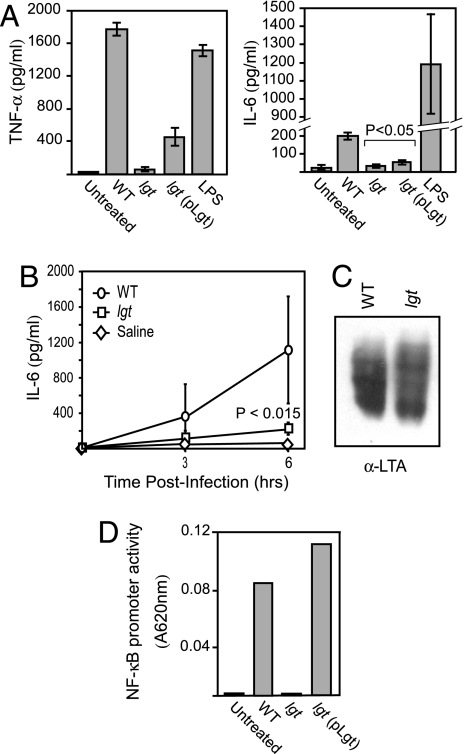Fig. 2.
Lack of recognition of lgt mutants by the innate immune system. (A) Incomplete Freund’s adjuvant-elicited peritoneal macrophages were harvested from C57BL/6 mice and treated with either heat-killed staphylococci (5 × 106 cfu/ml) or LPS (0.1 μg/ml) for 18 h or untreated. The production of TNF-α (Left) and IL-6 (Right) was measured by ELISA. LPS was used as a control. (B) Serum cytokine production in response to infection with live staphylococci in vivo. Fifteen mice infected with 5 × 106 cfu of bacteria were anesthetized, and three mice were terminally bled at 0, 3, and 6 h after infection, respectively. Sera were collected by centrifugation after clotting and assayed by ELISA for IL-6. (C) lgt mutants produce normal amounts of LTA. Saturated staphylococci cultures were disrupted by using a bead beater, and insoluble material was resuspended in 4% SDS and separated by SDS/PAGE, followed by immunoblot analysis using anti-LTA antibody. (D) 293 cells expressing TLR2 were transfected with a secreted alkaline phosphatase (SEAP) reporter plasmid under the control of an NF-κB inducible promoter. Coculture of these cells with wild-type (WT) S. aureus revealed induction of NF-κB promoter activity, whereas coculture with lgt mutant S. aureus failed to induce NF-κB promoter activity. Plasmid-encoded lgt (lgt/pLgt) restored TLR2-mediated NF-κB promoter activity.

